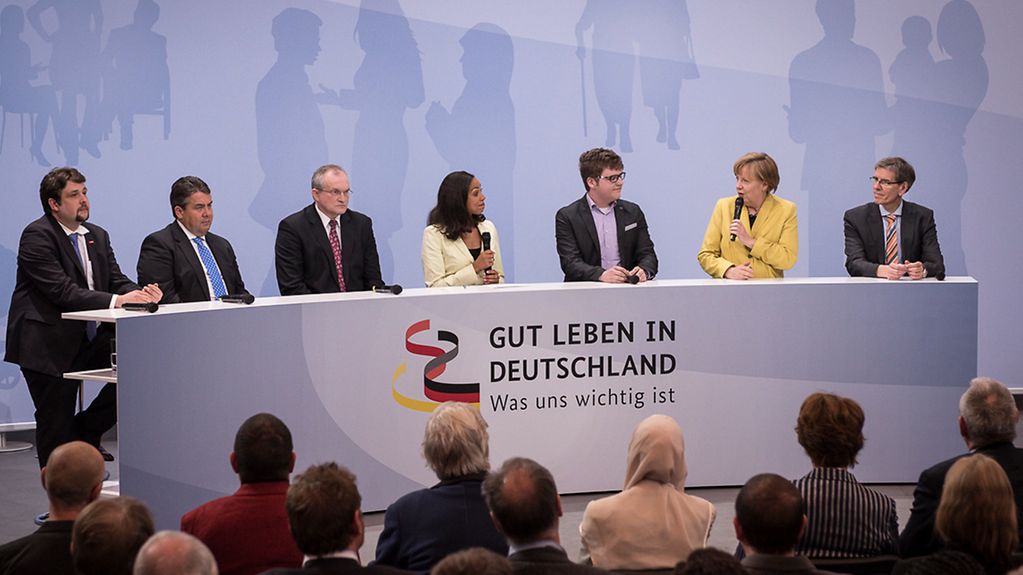Germany in dialogue
The Chancellor has opened the national dialogue in Berlin with Federal Economic Affairs Minister Sigmar Gabriel. "Have the courage to accept diversity," were the parting words of the Chancellor to the organisers of dialogue events up and down the country.
3 min reading time

Everybody in Germany is invited to get involved, at one of the many dialogue events or online
Photo: Bundesregierung/Kugler
In the Gasometer in Berlin-Schöneberg Chancellor Angela Merkel today launched the national dialogue "Living well in Germany – what is important to us". Speaking to representatives of the organisers of dialogues from the length and breadth of Germany, the Chancellor said that the things that are important to people vary enormously, and that politicians do not always know which of these matters is most urgent. The national dialogue aims to establish just that.
What do the people in Germany believe is important? "We don’t have an answer," said Sigmar Gabriel, Federal Minister for Economic Affairs and Energy. "We are putting a question that we have deliberately phrased in an open way." Where it is a matter of people’s priorities, added the Chancellor, the nation’s politicians intend to listen closely. "We don’t know the answers," said Angela Merkel, "and we are making an effort not to believe that we know them. We are curious to see what emerges."
"We depend on public debate," underscored Sigmar Gabriel. The way politics shapes the country has changed in Germany, he added, and now politicians must find new ways of reaching as many people as possible.
Guarantee for a strong democracy
Following the initial addresses, presenter Jana Pareigis moved on to the panel discussion with the two top politicians, three organisers of dialogue events and one representative of the academic advisory board. They looked at different ways of approaching the question of the quality of life.
Tom Beyer, member of the national conference of school students, outlined his experience with the political commitment of young people. Young people, he said, are quick to realise that democracy is not a service that is provided but a phenomenon that depends on our becoming involved. "Vibrant civil society is a guarantee for a strong democracy," confirmed Sigmar Gabriel.
Dennis Radtke, Secretary of IG BCE, the trade union for the mining, chemicals and energy industries, noted that in his experience many people see work as a very important factor in their wellbeing – achieving a good work-life balance, for instance. Formats like the national dialogue offer a good opportunity to conduct a different sort of discussion on this topic for once. Professor Dr Christoph M. Schmidt, member of the academic advisory board, explained that the national dialogue on this important issue can help establish whether or not the scientific and research community has always drawn the right conclusions in the past.
In favour of lively dialogue
Ulrich Aengenvoort, Director of the German Adult Education Association (DVV), reported on his positive experience with open dialogues. When politicians are genuinely interested in what the people think, as is the case in the national dialogue, the people become interested in politics. Discussions within heterogeneous groups using appropriate formats are particularly well suited to generating positive results in his experience.
The Chancellor stressed that the inputs to the national dialogue will be scientifically evaluated and summed up in an action plan of the German government. The idea is then to translate them into practical actions as soon as possible. "This is not something we want to put on the back burner," said Angela Merkel. She wound up by calling on the multipliers of the national dialogue not to shy away from diversity in discussion and to embrace a lively debate. "The best thing for all of us would be a productive culture of debate."